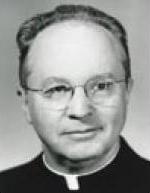 |
| Fr. John R. Connery, S.J. |
PRUDENCE AND MORALITY by FR. JOHN R. CONNERY, SJ.
PRUDENCE to the modern mind suggests caution. The prudent man is the man who takes no risks. He is a conservative who will neither raise his head above the crowd nor stand out from it. If such prudence is associated with morality at all, it is with a kind of moral mediocrity. The prudent man never does anything very bad; neither does he do anything very good. Prudence of this stamp hinders rather than promotes perfection. If everybody practiced it, there would be no heroes because there would be no such thing as heroic virtue. In fact, a premium would be put on inactivity.
The less a person did or said, the fewer mistakes he would make, and hence the more prudent he would be considered. To some the word may suggest something more positive, but at most it connotes nothing more than a kind of secular virtue. It is the virtue of the "children of this world." The prudent man is the worldly-wise man. He knows how to make his way around this world; he is the successful business man.
At its best, such prudence is indifferent to morality; at its worst, it is directly opposed to it. Moral t heologians themselves may have unwittingly cooperated in this secularization of the virtue of prudence. A glance through modern manuals of moral theology leaves the impression that it has little moral significance. If it is treated at all, it is dealt with only in passing, or at most as a kind of isolated virtue.
Since the time of St. Alphonsus Ligouri moral theology has been built around the commandments rather than around the virtues, and while this is a more convenient approach in a subject of interest chiefly to confessors, it is concerned more with vice than with virtue.
Justice and temperance, it is true, have survived this approach in moral text books, but prudence has lost the key position which it held in Scholastic moral treatises.
Link (here) to read the full article










No comments:
Post a Comment